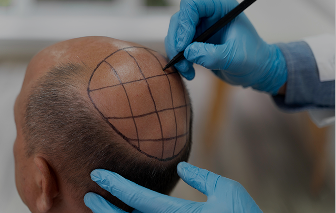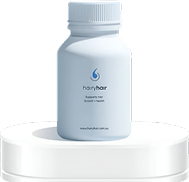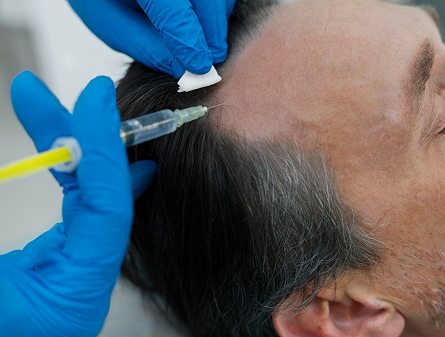A hair transplant is a surgical procedure that involves moving healthy hair from the back of the scalp (donor area) and implanting it in a balding area. Once implanted, the healthy hair grafts can produce new hairs and fill balding or thinning areas of the scalp. Hair vitamins can help to prevent hair shedding.
Supplements can contain beneficial nutrients to support hair growth and tackle nutrient deficiencies that have weakened hair follicles. A hair transplant is a surgical intervention that can provide long-term results with the best results being in those whose hair loss has stabilised.
A hair vitamin supplement can be useful for those who have hair loss as a result of alopecia areata, alopecia totalis, alopecia universalis, and androgenic alopecia (pattern baldness) according to indications from studies. Discover the differences between hair transplants and hair vitamins in the comparison table below.
- Hair transplants involve surgically moving hair follicles to restore density in balding areas.
- Unlike hair vitamins, the results are immediate and visible.
- Hair vitamins nourish the hair from within, supporting strength and growth.
- Compared to transplants, they are non-invasive and suited to early thinning.
- Hair transplants in Australia typically cost $5,000–$15,000, depending on the clinic and number of grafts.
- Higher upfront cost, but may be a one-off solution.
- Hair vitamins cost around $10–$30 per month.
- Unlike transplants, they are more affordable initially but accumulate over time.
- Hair transplants are completed in 1–2 sessions with full results in 6–12 months.
- Minimal follow-up is required once healing is complete.
- Hair vitamins are taken daily and may take 2–4 months to show results.
- Compared to transplants, they require ongoing intake for lasting effect.
- Hair transplants are surgical and relocate follicles to balding regions.
- Involves anaesthesia, incisions, and recovery time.
- Hair vitamins are taken orally and work systemically.
- Unlike transplants, no procedure or recovery is involved.
- Hair transplants have risks like infection, swelling, and scarring.
- Safe when performed by a licensed specialist.
- Hair vitamins are generally safe, but can cause issues if overdosed.
- Compared to surgery, they carry fewer risks and are less invasive.
- Transplants require a one-time clinic procedure and aftercare.
- No daily maintenance needed post-recovery.
- Hair vitamins are easy to use, requiring just a daily capsule.
- Unlike transplants, they demand long-term commitment but minimal effort.
- Hair transplants require a qualified surgeon and specialised facilities.
- Less accessible due to cost, location, and availability.
- Hair vitamins are widely available in Australian pharmacies and health stores.
- More accessible and suitable for general use.
- Hair transplant results are permanent for most patients once follicles take hold.
- No ongoing treatment is required for transplanted hair after recovery.
- Hair vitamins must be taken continuously to sustain improvements.
- Compared to transplants, results fade once usage stops.
- Hair transplants are often combined with supplements like vitamins for healing support.
- Surrounding hair can be maintained with minoxidil or low-level laser therapy.
- Hair vitamins complement both pre- and post-transplant care routines.
- Unlike transplants, they are not corrective but preventative and can pair with more practical treatments such as minoxidil or finasteride.
- Hair transplants appeal to users wanting a visible and noticeable improvement in hair density.
- Viewed as a definitive step to recover hair, but surgery can be a concern for some.
- Hair vitamins attract those preferring natural, wellness-based routines.
- Compared to surgery, they are not invasive and more holistic.
- Hair transplants improve cosmetic appearance but don’t affect general health.
- Limited to aesthetic improvements.
- Hair vitamins benefit wellness by supporting skin, nails, and energy levels.
- Unlike transplants, they offer broader nutritional advantages.
- Hair transplants produce one-time clinical waste.
- Environmentally friendly after procedure completion.
- Hair vitamins generate recurring plastic waste from monthly bottles.
- Less sustainable than a one-time surgical option.
Shop our hair solutions
We are committed to providing affordable hair regeneration services for people all over Australia. Our formula can help you regain your confidence.
Shop Now

Hair Transplant vs Vitamins Effectiveness Comparison Summary
A hair transplant can provide impressive results for covering balding areas. Transplanted grafts of hair can have a survival rate of over 90 per cent depending on the skill of the surgeon and the quality of the clinic chosen.
The effectiveness of hair vitamins requires further research and may take longer to see results with studies suggesting visible improvements to hair count and density after 6 and 12-month periods. The best results are seen with those who use hair vitamins to counter a nutrient deficiency that is causing their hair loss.
A hair transplant can be an expensive treatment option that requires significant time in the planning and aftercare of the procedure. Costs can vary depending on where you get the treatment done, the quality of the clinic, and the skill of the surgeon.
Hair vitamins are a comparatively cheaper option but may not be as effective a solution, depending on the extent of your hair loss. Subscription services for hair vitamins can provide discounts for regular deliveries of supplements.
User Guidance
A hair transplant procedure can take anywhere from 4 to 8 hours per session, and the recovery can last up to 3 weeks. This can be a significant disruption to your daily life, so it warrants time and planning. Hair vitamins can be taken as a daily oral supplement, meaning they are not as disruptive to your daily routine. Consistent use is required to see results, however, whereas a hair transplant is typically a once-off treatment.
There are some potential side effects with a hair transplant, as it is a surgical procedure. This can include swelling and bleeding along with inflammation of the hair follicles.
Hair vitamins are generally considered safe but should be taken under the supervision of a doctor or healthcare professional to ensure you are not over-consuming certain vitamins or minerals. Taken in excess, certain vitamins can cause hair loss or more serious health consequences.
Take Our Hair Loss Quiz to See Which Treatment Suits You?
Take A Hair Quiz

Frequently Asked Questions
We have put some commonly asked questions.
Nunc scelerisque tincidunt elit. Vestibulum non mi ipsum. Cras pretium suscipit tellus sit amet aliquet. Vestibulum maximus lacinia massa nontor.
Platelet-rich plasma (PRP) treatment involves drawing blood from the patient, isolating the beneficial nutrients and injecting it into the scalp where hair loss is occurring. This promotes hair growth and has many other applications from encouraging healing to skin rejuvenation.
Platelet-rich plasma (PRP) treatment involves drawing blood from the patient, isolating the beneficial nutrients and injecting it into the scalp where hair loss is occurring. This promotes hair growth and has many other applications from encouraging healing to skin rejuvenation.
Platelet-rich plasma (PRP) treatment involves drawing blood from the patient, isolating the beneficial nutrients and injecting it into the scalp where hair loss is occurring. This promotes hair growth and has many other applications from encouraging healing to skin rejuvenation.







 See All
See All